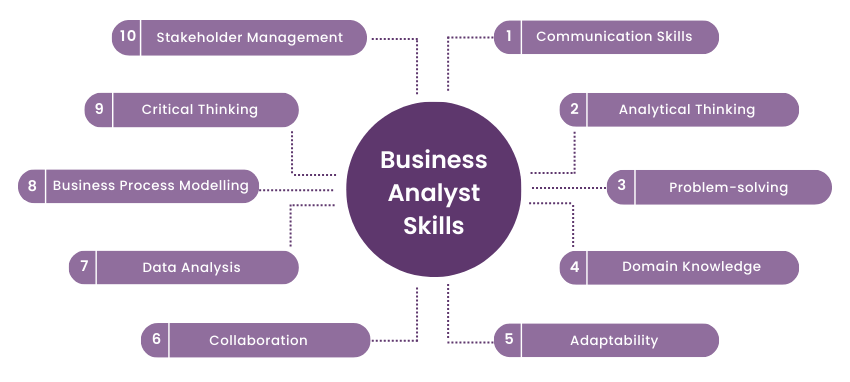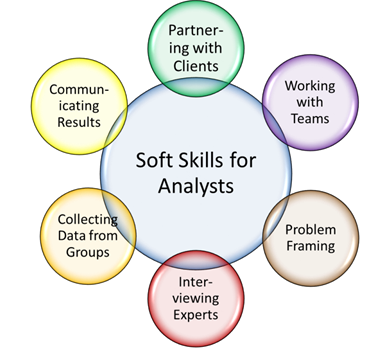Top Business Analyst Skills for 2026
Table of Contents

Companies now operate in a highly data-driven environment. Every decision, from product launches to customer retention strategies, is backed by analytics. This is where a business analyst becomes indispensable.
In this blog, we’ll break down the must-have business analyst skills, highlight emerging trends, and show you how to position yourself as a top-tier professional in the field.
Core Business Analyst Skills You Can’t Ignore

*theknowledgeacademy.com
The skills required for business analyst can be mainly divided into three buckets:
- Analytical & Problem-Solving Skills
- Communication & Interpersonal Skills
- Technical & Digital Skills
Below, we’ll explore each business analyst skills in detail, giving you real-world examples and even showing how these skills interact in day-to-day work.
1. Analytical & Problem-Solving Skills
Analytical skills form the foundation of any business analyst’s toolkit. But it’s more than just number-crunching, it’s about interpreting patterns, diagnosing issues, and recommending solutions that create measurable impact.
Some must-have analytical skills include:
| Skill | Why It Matters | Practical Example |
|---|---|---|
| Critical Thinking | Evaluates solutions objectively | Comparing multiple software vendors to select the most cost-effective option |
| Data Analysis | Converts raw data into actionable insights | Identifying sales trends and predicting market demand |
| Problem-Solving | Resolves operational inefficiencies | Streamlining supply chain bottlenecks |
| Decision-Making | Supports strategic business choices | Advising on product launch strategies based on market data |
Tip: Analytical excellence is about asking the right questions, not just finding answers. A curious, methodical approach often uncovers opportunities that others overlook.
2. Communication & Interpersonal Skills
Even the strongest technical analysis loses impact if you cannot communicate it effectively. Business analysts act as the bridge between technical teams and business stakeholders, and that requires clarity, persuasion, and empathy.
Core communication skills include:
- Data Storytelling: Turning numbers into narratives that stakeholders can act on.
- Active Listening: Understanding business needs before offering solutions.
- Stakeholder Management: Balancing conflicting priorities without losing alignment.
Visual communication is also key among the business analyst skills. Dashboards, charts, and concise presentations often speak louder than lengthy reports.
3. Technical & Digital Skills
Technical business analyst skills are no longer optional, they’re expected. Mastery of modern tools enables analysts to manipulate data, model processes, and present insights effectively.
Some technical skills required for business analyst in 2026 include:
| Technical Skill | Tools | Purpose |
|---|---|---|
| Data Analysis | Excel, SQL, Python | Extracting, cleaning, and interpreting datasets |
| Business Intelligence | Tableau, Power BI, Looker | Visualizing data for executives and teams |
| Process Modeling | BPMN, Lucidchart | Mapping workflows to identify inefficiencies |
| Requirements Management | Jira, Confluence | Capturing and tracking project requirements |
| Automation & Coding Basics | Python, R | Automating repetitive tasks and conducting advanced analytics |
Quick Tip: You don’t need to be a coding expert, but understanding technical workflows enables you to ask the right questions and communicate effectively with IT teams.
Emerging Business Analyst Skills for 2026
Here’s a deeper look at the emerging business analyst skills for 2026:
1. AI and Automation Literacy
Business analysts must understand how to leverage these tools to enhance their work:
- Predictive Analytics: AI can forecast market trends, customer behavior, and operational risks. Analysts who can interpret these insights provide immense value.
- Automated Reporting: Automation tools can reduce time spent on repetitive reporting tasks, allowing analysts to focus on strategic analysis.
- Smart Data Processing: AI-driven data cleaning and visualization tools help analysts handle larger datasets efficiently.
2. Cross-Functional Knowledge
Modern business problems are rarely confined to a single department. Analysts who understand finance, marketing, operations, and product development are better positioned to offer actionable solutions. So, you must posses cross-functional business analyst skills, like:
- Finance: Understanding budgets, revenue streams, and cost structures helps analysts provide recommendations that align with financial goals.
- Operations: Insights into workflow processes and supply chains enable more efficient solutions.
- Marketing & Customer Insights: Analysts who can interpret campaign data, customer feedback, and market research can influence growth strategies effectively.
3. Continuous Learning
The pace of technological change means that a business analyst must never stop learning. Staying current is no longer optional, it’s an essential business analyst skill.
- Tool Mastery: Regularly updating skills in BI platforms, SQL, Python, or visualization tools like Tableau or Power BI.
- Industry Trends: Understanding how emerging technologies, regulations, or market shifts affect business strategy.
- Certifications & Training: Engaging in formal learning opportunities, workshops, and online courses to stay competitive.
Why These Skills Matter:
Companies aren’t just hiring “data handlers.” They are looking for business analysts who can drive decisions, influence strategy, and lead initiatives. Analysts who embrace these emerging business analyst skills will:
- Become trusted partners to leadership rather than just project executors.
- Influence not only tactical decisions but also long-term strategy.
- Stay relevant and competitive in an increasingly automated, AI-driven business environment.
Pro Tip: Treat business analyst skill development as a layered process. Start with mastering core analytical and technical skills, then layer cross-functional knowledge, strategic thinking, and AI literacy to become indispensable in the modern workplace.
Must-Have Soft Business Analyst Skills That Make a Difference

*pubsonline.informs.org
Beyond analytical and technical capabilities, there are soft skills that define standout business analysts:
- Curiosity: Are you genuinely interested in how things work and why people make decisions? Curiosity fuels your insights.
- Adaptability: Business landscapes change fast. You need to pivot and find solutions quickly.
- Attention to Detail: Sometimes, a tiny anomaly in data can signal a big problem. Spotting it early is key.
- Collaboration: Rarely do analysts work in isolation. Being a team player makes projects smoother.
Ask yourself: which of these skills do you already excel at, and which need sharpening? Being honest here is your first step toward improvement.
Real Project Ideas to Sharpen Your Business Analyst Skills
Learning business analyst skills isn’t just about theory, it’s about applying them. One of the best ways to grow is by working on hands-on projects that mimic real-world challenges.
Here are some practical ideas to get started, which can significantly sharpen your business analyst skills:
1. Sales and Customer Analytics Project
- Collect sample e-commerce or retail data (many free datasets are available online).
- Analyze consumer behavior, segment users, and identify patterns in purchasing trends.
- Build dashboards in Power BI or Tableau to visualize insights for potential business decisions.
Skill Focus: Data analysis, visualization, storytelling.
2. Process Improvement Simulation
- Map a workflow from a small business or fictional scenario using Lucidchart/BPMN.
- Identify inefficiencies and propose optimized steps.
- Quantify potential time or cost savings.
Skill Focus: Process modeling, problem-solving, strategic thinking.
3. Predictive Analytics Exercise
- Use historical datasets to forecast trends, such as sales, website traffic, or customer churn.
- Experiment with Python or Excel for predictive modeling.
- Interpret results and recommend actionable strategies.
Skill Focus: Technical skills required for business analyst, critical thinking, decision-making.
4. Stakeholder Communication Simulation
- Take one of your analysis projects and prepare a presentation or dashboard as if presenting to executives.
- Practice converting numbers into insights and actionable recommendations.
Skill Focus: Communication, data storytelling, influence.
5. Cross-Functional Mini Project
- Collaborate with peers or use publicly available data to combine insights from marketing, finance, and operations.
- Prepare a report that shows how decisions in one function affect the others.
Skill Focus: Cross-functional knowledge, analytical thinking, collaboration.
Pro Tip: Even small, self-driven projects can accelerate skill growth. Keep a portfolio to showcase your work; it’s one of the best ways to demonstrate your business analyst skills to potential employers.
How Jaro Education Can Help You Upskill as a Business Analyst
We know that developing top-notch business analyst skills isn’t just about learning tools. It’s about building the confidence to turn data into strategy and insights into action. That’s why we at Jaro Education, a leading upskilling platform, bring you courses to bridge the gap between knowledge and real-world impact.
With programs like the Executive Program in Business Analytics (EPBA) by Adani Institute of Digital Technology Management, you get hands-on experience while learning business analyst skills from industry experts.
From live online sessions to virtual capstone projects, the program helps us master everything from Python and Power BI to data-driven decision-making and stakeholder communication.
What you will love most is the flexibility, it’s designed for working professionals, so you can learn without disrupting your careers. Plus, the mentorship, networking opportunities, and career guidance make it easier to translate new business analyst skills into tangible growth.
In short, with Jaro Education, you’re not just learning technical business analyst skills required for business analyst roles, you’re preparing to become strategic problem-solvers, ready to influence decisions and drive business outcomes in 2026 and beyond.
Conclusion
Mastering business analyst skills in 2026 goes far beyond handling data, it’s about becoming a strategic thinker, an effective problem solver, and a bridge between insights and action. And with the right courses, like those offered by Jaro Education, you can gain practical expertise, hands-on experience, and the confidence to drive real business outcomes.
Frequently Asked Questions
What are the skills required for business analyst in 2026?
Key business analyst skills include analytical thinking, communication, problem-solving, technical tools like SQL/Python, and emerging abilities like AI literacy.
Which technical skills are required for a business analyst?
The technical business analyst skills include SQL, Python, R, Power BI/Tableau, process modeling, and requirements management tools.
How can one develop the skills required for business analyst roles?
You can gain the skills required for business analyst roles through structured courses, hands-on projects, and practical industry training.
Why is AI and automation literacy important for business analysts?
AI and automation literacy help analysts handle large datasets efficiently and generate predictive insights, making it a critical business analyst skill.

















